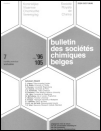Synthesis and reactivity of polychlorocyclopentanones
Abstract
Selective chlorination methods were elaborated for the conversion of cyclopentanone into 2, 2, 5, 5-tetrachloro-, 2, 2, 3, 5, 5-pentachloro- and 2, 2, 3, 3, 5, 5-hexachlorocyclopentanone. Dimethylformamide-hydrogen chloride mixtures served as catalysts for enolization and for dehydrochlorination to chlorinated cyclopentenones.
The reactivity of the polychlorocyclopentanones was tested towards zinc (in acetic acid, methanol or acetone) and towards bases in protic solvents. A number of chlorinated cyclopentenones, substitution products and open chain compounds (Grob elimination) were obtained in good yields.




